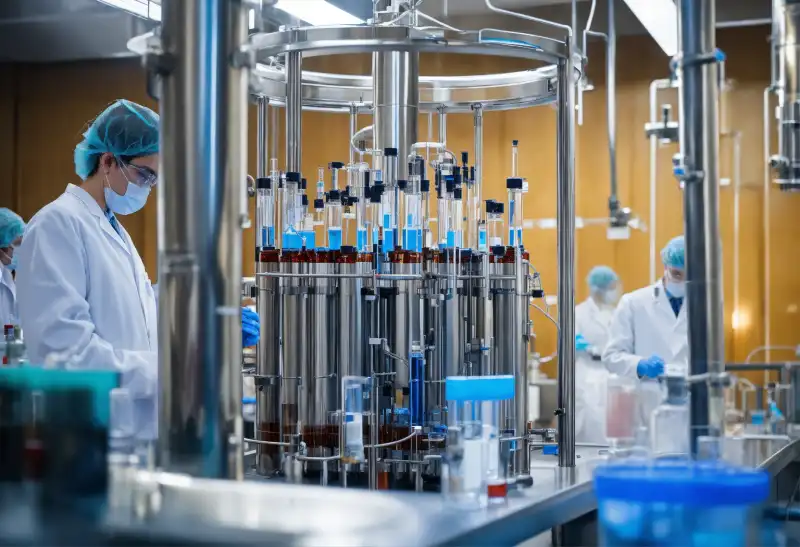For decades, they followed. Now, armed with AI, as Indian pharma companies take steps to lead, the global drug industry will never be the same again, writes Satyen K. Bordoloi.
India is renowned as the ‘pharmacy of the world’. And that’s not just because we produce 60% of the world’s vaccines, or because we are the globe’s largest providers of generic medicines that save hundreds of millions of lives with our affordable doses.
No! We are also called that because we are an emerging leader in biopharmaceuticals with over 3,000 pharmaceutical companies and approximately 10,500 manufacturing units, including 650 US-FDA-compliant plants – the largest outside the US; valued at $55 billion and expected to reach $120-130 billion by 2030.
Yet, the primary reason is that our low-cost skilled labour and robust infrastructure ensure that it is in India’s pharma industry that innovation truly meets affordability. And that part is getting another shot in the arm – pun intended – thanks to the enthusiastic adoption of AI in drug discovery and healthcare.

AI in the pharma market is projected to grow from $2.92 billion in 2024 to $9.64 billion by 2029 at a CAGR of 26.2%. This is because our companies are aggressively integrating AI across their value chains to accelerate drug development, reduce costs, and maintain global competitiveness.
Several factors are driving this. The key one is cost pressure. Traditional drug discovery costs about $2.8 billion per approved drug. AI presents a major cost saving by accelerating the identification of potential drug targets and optimising clinical trials. AI also helps our companies spruce up their R&D capabilities to transition beyond generic manufacturing to innovative drug development.
Then there is the Government of India’s Production Linked Incentive (PLI) schemes and policies to enhance domestic manufacturing and reduce reliance on imports. Launched in 2021, it provides incentives based on incremental sales. This is inspiring pharma companies to integrate AI into their operations in drug discovery, clinical trials and supply chain optimisation to meet the performance benchmarks required under the schemes. In that sense, AI is becoming a strategic enabler.

AI INVESTMENT AREAS IN INDIAN PHARMA
Indian pharma companies are putting AI to use in almost everything in their pipeline. According to McKinsey, generative AI could generate $60-110 billion annually in economic value for the pharma and medical-product industries by boosting productivity across the value chain. As per reports, nearly 50% of Indian pharma firms are exploring GenAI proof-of-concept initiatives, and a quarter have already implemented AI solutions in live production environments.
There has been heavy investment in AI to analyse molecular structures, predict drug-target interactions, and identify candidates in silico (digitally, before actually manufacturing them). Along with the virtual screening of millions of compounds and modelling of protein interactions to generate therapeutic leads, AI can significantly reduce the time required for traditional R&D timelines.

AI is already streamlining clinical trial design and recruitment, addressing high costs and slow timelines. Predictive analytics optimises protocols and hastens the identification of patient cohorts. Novartis’ Hyderabad unit utilised AI to expedite participant selection for global submissions. AI co-pilots are improving cost efficiency by 20% and enrolment speed by up to 20%, while smart data systems are cutting database lock time by over 50%.
AI-powered systems are also being used to enhance inspection accuracy and regulatory compliance. Computer vision detects anomalies in tablets and packaging, reducing defects and recalls. Predictive maintenance tools are used to monitor equipment health, minimising downtime and preserving batch integrity. Take global giant GE HealthCare’s OnWatch Predict, which cuts MRI downtime by 40%, being used in India via a joint venture with Wipro GE Healthcare Pvt Ltd.
AI and genomics are also pushing the personalised medicine market in India. The AI in the precision medicine market in India is projected to reach $710.9 million by 2030, growing at a 37.2% CAGR. AI-driven tools are being developed to assist in designing personalised therapies, selecting appropriate dosages, and flagging potential reactions. Apollo Cancer Centre launched India’s first AI-Precision Oncology Centre, while MedMitra AI raised INR 3 crore to expand its diagnostic platform.

MAJOR AI INITIATIVES IN INDIAN PHARMA
Sun Pharmaceutical, India’s largest pharma company by revenue, is leveraging AI for molecule screening, toxicity prediction, and automating literature reviews, while Dr Reddy’s Laboratories is deploying computer vision for packaging validation and piloting chatbots to improve chronic therapy adherence.
Cipla, meanwhile, has integrated AI into smart inhalers and partnered with IITs for respiratory diagnostics, whereas Glenmark Pharmaceuticals is using AI for tumour profiling and dermatological innovations. Biocon is investing in protein modelling and genomics-driven cancer therapies, and Zydus Lifesciences is applying machine learning to vaccine efficacy and diabetes care, expanding diagnostic access in Tier 2 cities.
Lupin is deploying AI in its R&D and manufacturing operations with a strong R&D program near Pune employing over 1,400 scientists.
However, the real fun use of AI is in our booming biotech startup ecosystem, which has surpassed 10,000 firms this year, many of which are working on AI-related products. Take PopVax from Hyderabad, which is developing mRNA vaccines using computational protein designs incorporating AI. Bangalore’s Indegene, meanwhile, is using generative AI for content creation and pharmacovigilance.

Its NEXT Commercial Content Intelligence platform reduced time to market by 90% for a global pharma company, while its GenAI-powered “Avatar” solution cut video production costs by 40%. MedMitra AI from Jaipur, as stated earlier, has raised money to expand its AI-based platform for diagnosis and treatment planning, while CureBay is going into rural healthcare with AI-powered eClinics. These indicate a growing interest in VC funding for this sector in the country.
The Indian government has been pushing several initiatives to support AI adoption in the pharmaceutical and healthcare sectors. We already talked about the PLI scheme. There’s also the National Strategy for AI launched by NITI Aayog that focuses on healthcare as a priority sector for AI implementation. Multiple Centres of Excellence for AI in Healthcare (AI-CoE) have been announced along with AIIMS Delhi, AIIMS Rishikesh and PGIMER Chandigarh.
CHALLENGES
Despite a promising start and growth, Indian pharmaceutical companies face significant challenges in implementing AI. India doesn’t have the robust data architecture that is essential to handle complex datasets. Having had a late start in AI, despite jumping onto the digital bandwagon with gusto at the turn of the century, we are facing significant investment hurdles far beyond the reach of smaller companies. Although we have a great talent pool, the demand for AI experts has quadrupled since 2022, indicating that the nation is facing a shortage that can only be addressed through a comprehensive reskilling program.
Indian pharma has been found lagging in adhering to regulations like FDA compliance more than once. Ensuring our AI models meet stringent global regulations would require our companies to get rid of all their lazy fats. India also has lax ethical standards, be it in data privacy, or even practices related to clinical trials; a challenge entirely of the sector’s own making.

Complicating all of that are government regulations that are often arbitrary, needlessly complex, at times involve corruption and take several months for simple clearances. These hamper the pharma sector’s innovative spirit and competitiveness.
Indian pharma companies, however, can mitigate these challenges to capitalise on latent global opportunities by taking a few key steps. The first and foremost is to enhance partnerships between academia and startups to create an innovation ecosystem similar to global models. Talent is key in every business, even here, and companies need to develop comprehensive AI training programs and collaborate with educational institutions to build a sustainable talent pipeline.
They also have to work with regulatory bodies and governments to modernise regulatory frameworks, develop ethical systems both for patient safety and responsible AI practices to address concerns like data privacy, security and bias, among others. These companies also have to invest in secure, scalable data management systems to handle complex datasets required for AI applications.
India’s pharmaceutical industry is slated to double in the next five years, from its current valuation of $66–70 billion, to reach $130 billion by 2030 and potentially grow to $450 billion as India turns 100 in 2047. The tech that is leading this expansion from the front is AI adoption, which is accelerating drug discovery, clinical trials, and manufacturing.
With AI as the catalyst for the pharma industry, India is poised to evolve from the pharmacy of the world to its healer. We are no longer just supplying pills; we’re writing the future of global healing.
In case you missed:
- Cure Every Disease: How AI is Rewriting the Future of Medicine, and Humanity
- How India Can Effectively Fight Trump’s Tariffs With AI
- OpenAI, Google, Microsoft: Why are AI Giants Suddenly Giving India Free AI Subscriptions?
- The B2B AI Revolution: How Enterprise AI Startups Make Money While Consumer AI Grabs Headlines
- 2025 – Year of Gene Therapy: Curing Lymphoma & Wiskott-Aldrich Syndrome, & Using AI
- How Can Indian AI Startups Access Global VC Funds?
- The Great AI Correction of 2026: Why the ‘Bubble’ Popping Could be the Sound of Growing Pains
- Why is OpenAI Getting into Chip Production? The Inside Scoop
- GoI afraid of using foreign GenAI in absence of Indian ones? Here’s how they still can
- 95% Companies Failing with AI? An MIT NANDA Report Misread by All









